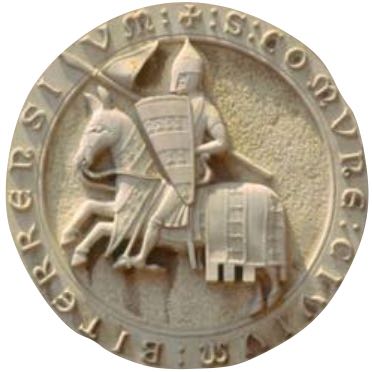
‘Recognise that imposing suffering on those holding heretical views is necessary if we are to save their souls.’
Amaud Littorale – 20th February 1355
On the table, only the purest white tablecloths were used, adorned with silver plates and immaculate silver cutlery. An enormous fireplace occupied the entire inner wall. In the fireplace a log fire roared and crackled, effortlessly heating the enclosed space.
An elaborately carved servery, glowing golden from frequent polishing held on its upper shelves a selection of Cognac, Armagnac, and red wine from Bordeaux. On the third side of the alcove, ancient copper troughs cooled a selection of locally produced white wine including the famous sparkling wine from Limoux.
A heavy velvet curtain insulated the fourth side, the mouth of the alcove, from the main dining area. To ensure privacy, a bell-pull was located within reach of the head of the table. Only when the bell was rung would one of the immaculately clad waiters venture into the alcove.
Spicy fragrances, unexpected, unusual but not unpleasant, enveloped those who occupied the alcove, always reserved for the most distinguished of guests. The owner claimed that he had named the restaurant after the aroma, which he said was the smell of money, derived from the alcove’s most frequent patrons, the officers of the mint, located almost next door.
On this day the smell of money was most appropriate; Cardinal Amaud Littorale, the Pope’s personal appointee for the suppression of the Cathar heresy, wore robes of the finest cloth. A heavy gold chain encircled his neck and an assortment of gold rings almost obscured his fingers. He paused, stretched out both his hands to admire the rings, and adjusted several of them to what he judged to be the correct orientation relative to each other.
The Cardinal turned his attention to Philippe de l’Isle, his young assistant, who sat opposite him. Philippe held his hands clenched in a neat pile in front of him, his back straight as an iron pole, and his wide eyes firmly fixed on the Cardinal’s face. His food remained untouched.
The Cardinal could see that Philippe wanted to speak but was waiting for permission. ‘Yes, Philippe?’
Philippe took a deep breath in preparation. ‘Am I supposed to enjoy this, Your Eminence?’
The Cardinal furrowed his brow. ‘Enjoy what, the chicken? I think it is excellent.’
‘No, Your Eminence. I mean the interrogations, the torture.’
The Cardinal dropped a forkful of chicken with olives into his lap and gazed across the table. Philippe had been hand-picked from the Dominican seminary in Toulouse to be one of the three deputies of the Holy Inquisition in Pamiers.
The Cardinal removed the chicken from his robes. Then he said,’My son, you are engaged in a great initiative. You are helping to save the souls of these poor unfortunates.’
‘How exactly does torture do that?’
The Cardinal’s eyebrows rose and his mouth dropped open. ‘I am surprised you have progressed so far without knowing the answer to your own question. If someone has fallen into the trap of reading heretical texts, we may save their soul by putting out their eyes. If we identify someone who preaches heresy, ripping out their tongue might prevent hundreds of others from being led into heresy.’
Philippe dropped his head. ‘If only it was a simple as that, your Eminence.’
‘What do you mean?’
‘I have been here for six weeks, and I have seen no one capable of reading a heretical text, let alone preaching heresy.’
‘And?’
Philippe wriggled in his seat. ‘We torture them all and … some of my colleagues seem to enjoy it.’
‘What do you mean?’ The Cardinal hesitated. ‘Be specific.’
‘Well, the interrogations I have taken part in have been focussed on very ordinary people.’
The Cardinal narrowed his eyes. ‘Who may well be agents of the devil.’
‘Is a witch an agent of the devil?’ Philippe asked.
The Cardinal shook with indignation.
‘Of course, a witch is an agent of the devil. Why do you ask?’
‘Because four out of five of the poor unfortunates I have seen have been women.’
‘The Cathar heresy has long been supported, no, promoted, by women.’
Philippe raised his head and looked directly into the Cardinal’s eyes. ‘We begin by stripping them naked.’
The Cardinal nodded. ‘Philippe, that is standard procedure. Then we stick barbs into every part of the body, searching for the areas where no pain is felt. If we find such an area, the woman is proven to be a witch.’
‘Your Eminence, it is not easy to perform that task.’ He swallowed with great difficulty. ‘It inflicts great suffering. Those under suspicion must be tied down. In the case of women, they are always spread-eagled.’ Philippe hesitated. ‘My colleagues are visibly excited by this procedure.’
‘The devil strives to deflect our brethren from their true vocation.’
‘But if it is not possible to find an area where they have no pain, we still proceed with further interrogation.’
The Cardinal’s face reddened and his cheeks twitched with the clenching of his jaw. He found it impossible to conceal his annoyance. ‘Of course. It is not necessary to be a witch to be a heretic. Are the correct procedures then followed?’
‘Oh, yes, Your Eminence, religiously. We demonstrate the various instruments of torture and give the women every opportunity to recant.’
‘So what are you concerned about? Only committed heretics would face the pain we can inflict.’
‘Many of them do not have firm held beliefs. They do not know what to recant. Then there is the nature of the torture. For male suspects, the next stage is to tie their hands behind their back and hoist them into the air by a rope wrapped around their wrists. It results in the dislocation of their shoulders and the ripping of tendons. They will be cripples for the rest of their lives.’
‘For men?’ the Cardinal queried.
‘Yes, Your Eminence. For women, the next stage is an attack on their most sensitive parts, usually with red-hot tongs.’
‘So the women are more leniently treated than the men?’
Philippe’s eyes bulged, then narrowed. ‘I doubt if the women would see it that way, your Eminence.’
‘And what would you suggest as an alternative? We must use every means at our disposal to save these souls.’
‘We could put them in a school where they could be educated, where they could receive further instruction in the Roman faith.’
The Cardinal eyed Philippe carefully before coming to a decision.
‘Thank you, my son. I will consider carefully what you have said.’
Six days later, the Inquisition accused Philippe de l’Isle of sympathising with heretics and two days after that with heresy itself. The same Inquisition, for which he had been appointed a deputy, imprisoned and interrogated Philippe. He died eight weeks later.
The Cardinal did not eat chicken with olives in the whole of this period.
Phillipe’s successor, Augustus Domecq, was appointed only an hour after Phillipe’s arrest and immediately summoned to the Cardinal’s office.
The Cardinal wasted no time in issuing his instructions.’There is a nest of heretics in the Château de Foix,’ he said. ‘The parish priest at St Volusien belongs to our order and is an experienced member of the Inquisition. He is certain that the Comte, his family and his retainers are all heretics. They have acquired all the skills of deception. They attend the sacraments regularly to hide their true beliefs and their evil heretical practices. We must find a way of breaking this evil cell.’
He frowned and pursed his lips. ‘It is most difficult. The Inquisition; you, me, all of us, have effectively been excluded from the lands of the Comte de Foix by his adoption of English practices of law. The result is we have no power of arrest or imprisonment and without those powers, we cannot operate.’
The Cardinal leaned forward and glanced around before continuing. ‘There is a girl in the Château who it is claimed is heiress to much of, perhaps all, the lands of Occitan. Her family was dispossessed because of their heretic beliefs during the Albigensian crusade one hundred years ago, but they have never given up their claim. Now it comes down to this young girl.’
The Cardinal carefully scrutinised Augustus, before continuing.
‘The Pope is encouraging the Black Prince, the son of King Edward of England, to marry her.’
Another scrutiny. Still no reaction. ‘A deal has been done whereby the Pope will allow the Prince to take over his new wife’s inheritance and, in return, the English will change the way they implement their laws to allow the Inquisition into all their territories. The Comte de Foix would be forced to follow suit. We would then finally be able to eliminate the despicable heretics.’
Augustus winced. ‘ Then I don’t understand. It sounds like it is out of our hands. We can take action after the marriage takes place.’
‘No, it is not entirely out of our hands. It is possible that the girl might refuse to marry the Prince. She, the Comte de Foix or other Cathars may be plotting a renewed revolt against the Frankish King… ‘ he hesitated, ‘… and against the Church.’
Augustus stroked his chin. ‘And how can we know what is in her mind, if she is isolated within the Château and surrounded by supporters and sympathisers?’
The Cardinal smiled. ‘It is what I set out to explain. It will be your job to find out more. Go to Foix. Find someone who is prepared to give us more information. Sooner or later, someone will become unhappy with the way they have been treated within the Château. Once they talk to us, they, whoever they are, will become one of your creatures. You will threaten them with kidnap and torture if they do not give you everything you want. In the short-term, we need to know only one thing. Is this girl intending to marry the Black Prince or has she other plans?’
‘But even if she has other plans, we cannot arrest her.’
‘There will be a chance, there is always a chance… It will probably depend on the success of your information gathering. Make it known that there might be a reward. The smell of money can deliver some amazing results.’
He turned to rise but then sank back in his chair. ‘Oh! just one final point.’ He reached out and squeezed Augustus’ knee, pushing his finger and thumb deep into the fleshy area just above the kneecap. ‘Recognise that imposing suffering on those holding heretical views is necessary if we are to save their souls. If you don’t particularly like the work of interrogation and persuasion, find someone else to do it. You will find no shortage of volunteers.’
